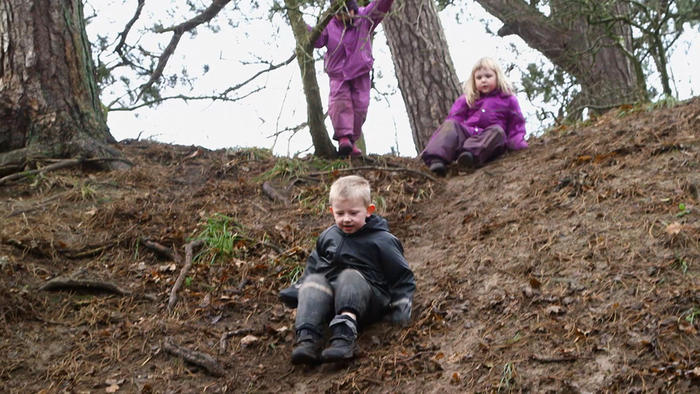Blog

Getting Back To Nature With Kids
Mon, 14th Mar 2016Getting outside with your kids influences their mental and physical wellbeing:
Children need exposure to natural places, to experience nature and all its wonders. Being outdoors is a healthy way to be with friends, test gross motor skills, test a child's limits, tackle obesity and appreciate the environment.
Then versus now:
Do you remember when you were a child, leaving the house in the morning and not returning until dinner time? All day we would ride our bikes, discover a wonderful tree to climb, make a cubby, or just laze around in a field making animal shapes out of clouds or creating a beautiful daisy chain. Our mum wouldn't be too concerned where we were as we knew our boudaries and respected them. Being outside was an adventure, an exciting overload of sensory experiences. Friends would catch up and play hide-and-seek or chasey and ride skateboards or play in each others backyards. We would be at one with nature, allowed to get dirty making mud pies, catching slimey creatures to bring home and the freedom was real. We would return home only when it was time to eat!
Many years ago when I was 10 years old, my fellow adventurers and I made a look-a-like snake from a piece of thick rope, covered it in wet, sticky mud, tied one end of the rope to fishing line and hid down a roadside embankment with the "snake" on the other side of the road. Our ingenious plan was to pull the snake, slowly across the road in front of an unsuspecting car and eagerly await the driver's shocked reaction.....as children, it was so funny we would roll down the embankment laughing uncontrollably......very fond memories.
The point is that these days our kids are much less likely to have such a connection to nature. Experts say kids spend around 7 1/2 hours a day using a smartphone, computer, TV or Ipod. It's worrying and frightening to know that around 80% of children under age 2 and more than 60% of children aged 2-5 lack daily access to outdoor play. We live in an era where outside play has become sporadic and highly supervised. Some schools even now over-police games and outside play; there are bans on tree-climbing, certain ball games and even cartwheels!
Are the parental fears of harm in our schoolgrounds justified?
In New Zealand, school playground rules were banned in several schools. Children were allowed to climb trees, negotiate play and choose their own adventure. The results were a drop in serious injury and a reduction in bullying and vandalism. This was because the children were allowed to assess and be responsible for their own risk-taking and choose their own adventure They learnt self-control and self-discipline thereby increasing autonomy and competence.
Get outside and have fun....
Adults should be role models for their kids and be active, not sedentary. Take a walk after dinner, play a sport, enjoy a walk in a park with the dog, go to the beach or trek up a hill. Kids like to use their whole bodies when they are outside, they love the freedom for big movements like running, jumping, climbing,swinging, rolling, kicking and throwing. These movements require balance, co-ordination, concentration and adaptability. Their wellbeing, health and fitness will benefit from the physical activity.
Babies love the sensory and tactile opportunities outdoors. Bird sounds, trees moving, leaves blowing in a breeze, colours of plants, clouds moving in the sky and feeling the grass beneath their tummies or feet.
Toddlers need a bit of supervision and like to help a parent outside in the garden, digging, washing the car, sweeping or hanging out washing. You could help them build a little cubby with things they find outside, play a game of hide-and-seek or help them learn to balance on a toy like a tricycle, or scooter.
Older kids can play games outside, climb a backyard tree or be involved in a structured activity like a junior sports team.
Wet weather should not be a deterrent, in fact kids will be excited by the prospect of rugging up in their Winter woollies and going outside to jump over puddles, feel the rain on their face and watch leaves blow from the trees. Visit the snow for another sensory adventure. Be creative, ignite their imagination!
In conclusion, the benefits of getting you children outside to play are vast - social, emotional and physical wellbeing improves. Having the space and freedom to fully and freely experience motor skills is imprtant. Cognitive development is also impacted as children outside can invent games, test limits and assess danger. Safety will always be an issue for parents who are reluctant to allow their children the freedom they had as kids. We have to weigh up the benefits versus risk and find a positive solution for our children. Now, go outside and play!
Now heres some great ideas for outside play:
Caterpillar Walk Awesome fun to do with a group of friends, take anywhere, very strong
Jumping Bag Set Sturdy nylon sack with 2 handles, watch the kids race eachother
Catchtail Balls (set of 6) Ballls have 1 metre long colourful tails. Throw, kick, sling the ball high in the air and catch by the tail.
 Where is Growing Child
Where is Growing Child